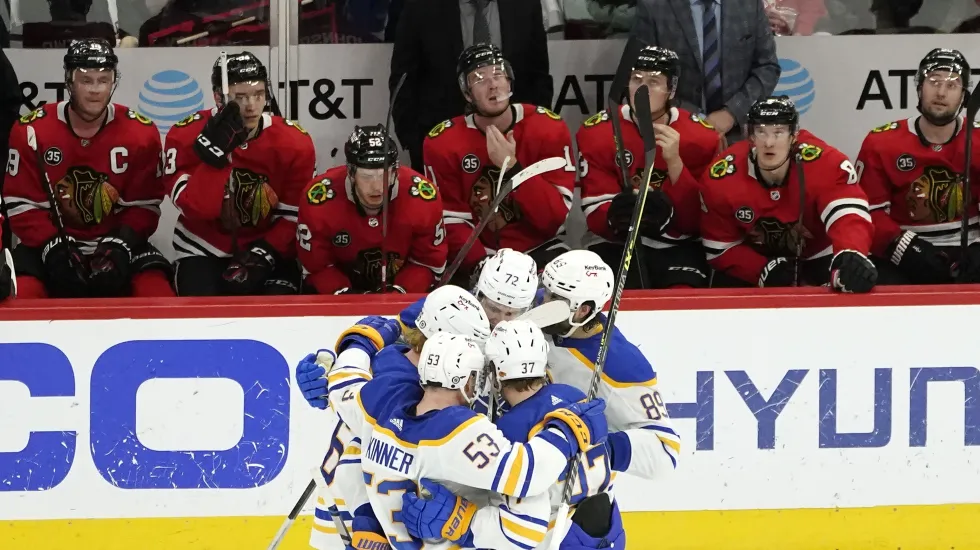
SAN JOSE, Calif. — The Blackhawks have blown 14 straight leads.
They failed to protect leads of 1-0, 2-1 and 3-2 against the Kings on
March 24. They squandered leads of 3-0 and 4-3 against the Golden Knights on March 26. They threw away leads of 4-0 and 5-4 against the Sabres on March 28.
They lost an early 1-0 lead against the Coyotes on April 3 and an early 2-1 lead against the Stars on April 10. They let the Sharks rally back from deficits of 1-0, 2-1 and 4-2 on April 14. They let a 2-1 lead against the Predators slip away last weekend. And they squandered a 3-1 lead against the Coyotes on Wednesday.
Spelling out all 14 instances is monotonous but underscores the point: Lead protection has been all but impossible over the last month.
The Hawks did win a few of those games (they’re 3-9-2 over the entire span) but only after letting their opponents rally to force overtime. Their last regulation win came March 23 against the Ducks, the first game after the trade deadline, and even that night, they blew leads of 1-0 and 2-1 before winning 4-2.
Interim coach Derek King has certainly noticed the trend, if not the exact number of times, and has talked frequently about the Hawks’ flawed mindset when operating in front.
“When we have the lead, we don’t realize that we don’t need to score a goal every shift we get,” King said Wednesday. “[When] we have a 3-1 lead, sometimes you need a ‘live to fight another day’ kind of attitude. You don’t have to make that extra play to see if we can get some offense going. That’s where we’re making mistakes, and that’s what has been costing us.”
The meltdowns against the Golden Knights and Sabres might still be contributing to the drought. Bad memories from those two games re-enter the Hawks’ minds whenever opponents start turning up the pressure.
But that’s not the only factor. As King said late last month, the Hawks also been afflicted by arrogance and loss of focus in those moments.
“I don’t know what they’re thinking when . . . they’re sniffing blood or sniffing points and they think they’re good enough to play that way,” he said angrily after the meltdown against the Sabres. “They’re not. There’s a few guys that can turn it on and take some chances and make some things happen. But the rest of them, they need to play a certain way to survive, to play in this league on a consistent basis. And when those guys start turning pucks over and not checking and missing assignments and stuff, then we’re in trouble.”
Digging into the numbers shows just how porous the Hawks’ situation defense has been. Between Nov. 6 — when King took over — and March 23, the Hawks allowed 25.4 scoring chances (per 60 even-strength minutes) when trailing, 28.0 scoring chances when tied, 30.8 scoring chances when ahead by one goal and 33.9 scoring chances when ahead by two or more goals. In other words, the more favorable the game situation, the worse their defense performed.
That’s not entirely surprising. The phenomenon is so common league-wide that it has a name: “score effects.” But it’s particularly pronounced with the Hawks, as evidenced by their NHL ranks in each situation. They’re 11th when trailing, 16th when tied, 20th when up by one and 28th when up by two or more.
And since March 24, their defensive woes have only worsened. They’ve allowed 27.0 scoring chances when trailing (1.6 more than before), 34.1 when tied (6.1 more than before), a whopping 40.5 when up by one (9.7 more than before) and 34.9 when up by two or more (1.0 more than before). Their NHL ranks in each situation are 18th, 27th, 30th and 24th, respectively.
“Maybe we get away from our game a little bit [when leading and] try to put more up on the board,” winger Alex DeBrincat said Wednesday. “But when we have a lead, we just need to play sound defense, not turn the puck over and hopefully we can get it in their zone — and then we can start playing offense. Those plays at the blue line can really change a game, so we’ve got to work on that.”
The data support the theory that the Hawks over-prioritize offense when protecting a lead. From Nov. 6 to March 23, they generated 24.1 scoring chances themselves (per 60 even-strength minutes) when up by one, which ranked 27th in the NHL. Since March 23, they’ve generated 27.7 scoring chances when up by one, which ranks 14th.
With only four games left in the season, starting with Saturday’s against the Sharks, the embarrassing trend is hardly worth outrage. But if King is brought back as permanent coach next season, fixing it is definitely something he’ll need to emphasize.







